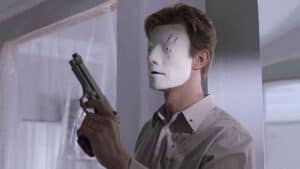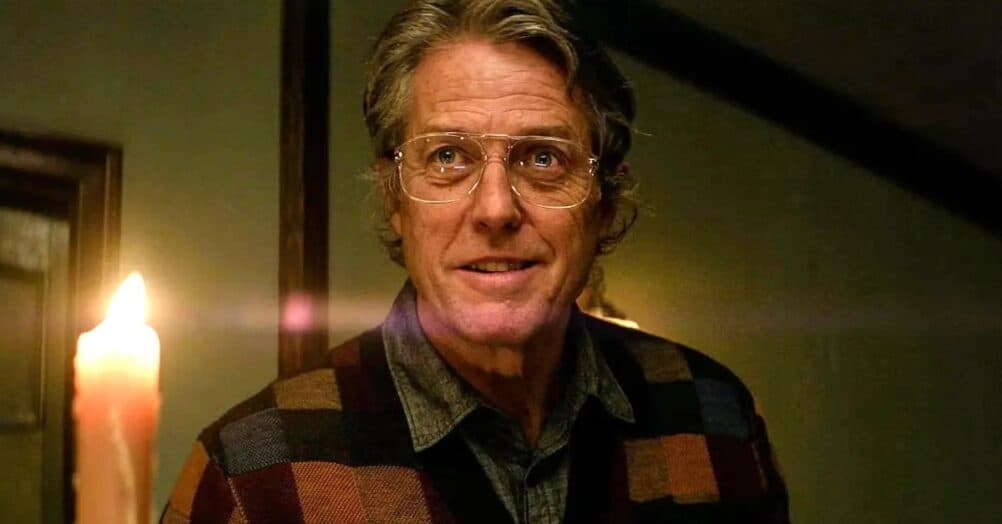Remakes are always a tricky proposition. Some of the greats both in the horror genre and elsewhere are actually remakes, whether it’s a loose one or not. Be it The Magnificent Seven coming from Seven Samurai or The Thing being birthed into imitation dog from the Christian Nyby and Howard Hawks original. I talk about The Thing A LOT but obviously it’s for a reason. You could also throw The Fly in that same category too while we are here. Those are some of the examples of the good but unfortunately, things can go downhill and fast. You have harmless ones like the Friday the 13th remake or Texas Chainsaw, the annoyingly unnecessary like Halloween and Amityville Horror, or the egregiously awful like The Fog and A Nightmare on Elm Street. Like them or loathe them, or in our case both, they are here to stay, and each passing year and decade gives us new possibilities to be mad at an unhinged level towards a piece of art that is trying to be an expression of that creator’s brain. 1999 happens to be one of the most packed years for movies ever but how does The Haunting (watch it HERE), one of the biggest releases that year, hold up? Does it carry the torch of justified remakes, or does it fail to stand the Test of Time?
Plot
I remember seeing Robert Wise’s seminal classic The Haunting as a rental and was admittedly a little bored. I then got the opportunity to see it at the old Bay theater in Seal Beach and suddenly I got it. It’s truly a masterclass of old school horror filmmaking where what isn’t seen is better and creepier than what is shown on screen. The movie, released in 1963, was based on the Shirley Jackson novel The Haunting of Hill House released four years prior. That title is probably a little more noticeable to recent fans as the brilliant show from Mike Flanagan was indeed also based on the work. Flash forward from 1963 to 1996 and two titans wanted to get together and make a horror movie. Steven with a V Spielberg approached Stephen with a PH King with the idea to make a haunted house picture together. Being of similar ages and tastes growing up, they agreed that The Haunting was the alpha and omega of ghost stories and that it should be the basis of their movie along with more elements from the novel.
Unfortunately, creative differences would split the pair and force the project in another direction. King would take the elements he liked from the screenplay and put them in his eventual TV miniseries Rose Red in 2002 while Spielberg would get a different screenplay from David Self. Jan de Bont would end up trading Minority Report directing duties to Spielberg for today’s movie and boy, both of those films could have looked very different indeed. De Bont is primarily known as a cinematographer but has also directed hits like Speed and Twister as well as non-hits like the second Angelina Jolie Tomb Raider movie and Speed 2. While this was David Self’s first script, he would also go on to write Road to Perdition and another maligned remake in The Wolfman.
The collection of talent in front of the camera is peak late 90s with Catherine Zeta Jones, Liam Neeson, Owen Wilson, and Lili Taylor in the 4 main roles and Bruce Dern and Virginia Madsen having smaller bit parts. Surprisingly, with how many movies he has done, Neeson only has this as his entry into horror. Jones also must have had a sour taste in her mouth because this is also her only horror role apart from maybe Morticia Addams in the Netflix show Wednesday. Lili Taylor on the other hand is more our speed. In addition to The Haunting, she has been in an episode of Monsters, The Conjuring, The Addiction, and Leatherface from 2017. Wilson hasn’t done any in quite a while but also gave us his character in Anaconda and the criminally underseen Minus Man.

The movie has 3 patients go to a large mansion property where they are told they are participating in a sleep study. What they don’t know is that the doctor who got them there is actually looking to get their responses to fear. Lots of supernatural events happen in the house and to the participant while Nell finds out that she is related to a matriarch of the property. In addition to that, she discovers that Crain, the owner of the house, used children as workers on his farm and mill and also tortured and killed many of the orphans that he was allegedly looking for homes for. The doctor admits what the study actually is and that he set up some of the spooky stuff for them to find.
This doesn’t hold for Nell as she has fully bought in to her belief in ghosts, murdered children, and her relation to the house. They try to leave and take Nell with her but the house, and ghost of Crain fight back in a way that leaves two of the patients dead and the surviving two with little to explain the events they saw. That 12 line synopsis is obviously a very scrunched down version of a movie that is, in actuality, a bit longer than it needs to be.
Signs of the Time
Within the movie itself there are only a couple that jumped out. One of them is Liam Neeson’s characters archaic brick of a cell phone that he drops while hanging from a banister while trying to save Nell. I had one of these for emergencies in high school where you had to literally pull the antenna up and out to make calls. Ah, simpler times. The other one really took me back and I didn’t even notice it right away. Nell had to get directions to the Crain mansion and on her dashboard is an honest to God printout from Map Quest. I remember printing many listed directions to get to where I needed to go and if you missed a turn, you were not given instant alternative directions. Those were the days my friends.
That’s what stood out inside the actual plot and world of the movie but if you are looking at the production or non-story elements, we have a few. Remakes weren’t as big as they would get in the years that immediately followed but it wasn’t uncommon either. 1990 gave us the Tom Savini directed remake of Night of the Living Dead and the year before this movie came out, we were gifted? Is that the right word? The dreadful Psycho remake. We would get a much more popular quasi-remake in 1999 with Brendan Fraser’s The Mummy. In line with mentioning that movie, the effects on The Mummy still hold up but here they look worse today than they did when they premiered. This isn’t uncommon as most CGI of the time was sketchy to make work well and most of it has not aged in a positive manner. Phil Tippet helped with some stuff and I hope it was the practical stuff or set design because all of the CGI stuff here looks rough. I’ve mentioned it multiple times on this channel, but CGI comes in waves of quality both good and bad.

What Holds Up
Not as much as I would like. Liam Neeson does a pretty decent job here with what he is given and is pretty much what you’d expect from the man at this point. Bruce Dern, for as small as his part is, adds a gruff, almost classic Hollywood appeal to the film and it would have been nice to have him in more than the few scenes he is in. The story itself is an interesting one even if it strays from both the 60s film and the book’s source material in a few major ways. It had the potential to be both interesting and frightening but falls flat completely in the latter and is woefully mishandled in the former. The score, here done by Oscar winner Jerry Goldsmith, is a high point for 90% of the movie but even it lets us down in a few key moments of the film. Finally, for all the complaints about the CGI that I have, the set design, sound design, and set decoration are incredible. I could look at the mansion and everything inside of it for hours. During the watch for this review, I found myself looking around the screen admiring the set rather than paying attention to the movie and had to rewind a couple times.
What Doesn’t Hold Up
Not to beat that dead horse but CGI, CGI, CGI. It is distractingly bad and how good everything else looks in the movie becomes a detriment when ghost Crain or ghost children try to come into the movie. Even the house itself attempting to rebel looks like a cartoon and not in a good way. While the story is interesting, the actual script and the deliveries and performances by the actors falls very flat. Some of the lines wouldn’t have worked regardless of who was delivering them but there are multiple times that the performances are worse than the written dialogue and even other times that the combo just makes everything worse. Lili Taylor is a good actor but her scream in bed is one of the least convincing horror screams I’ve heard in a movie and as good as most things look, the makeup for Crain in his old photos is so laughable that it takes the horror, and audience, right out of the movie. The culmination of the acting being a detriment is the lifeless reaction to Owen Wilson being decapitated in the fireplace. The way Liam Neeson looks away with a cringe is exactly how I feel about watching this movie again.
Verdict
The Robert Wise original is better, the book is MUCH better, and the Mike Flanagan 10 episode take on the material is honestly the best interpretation of it period. I really wanted to have a change of tune on this movie as it’s been over 20 years since I saw it. It wasn’t a flop at all with it making over 100 million, but the reviews were middling then and I’d say middling at best now. It’s not good enough to be, well, good, and not bad enough to fall under our awfully good banner. It’s regrettably boring and a frustrating watch to see good actors fall flat with a script that takes a great idea and story and does its best to scuttle the whole thing. The Haunting doesn’t need further study to show it falls short of standing the Test of Time.
A couple of the previous episodes of The Test of Time can be seen below. To see more, click over to the JoBlo Horror Originals YouTube channel – and subscribe while you’re there!


















Follow the JOBLO MOVIE NETWORK
Follow us on YOUTUBE
Follow ARROW IN THE HEAD
Follow AITH on YOUTUBE